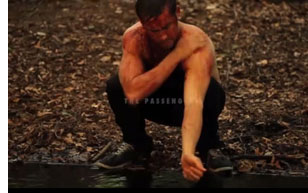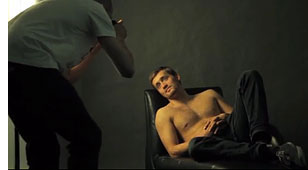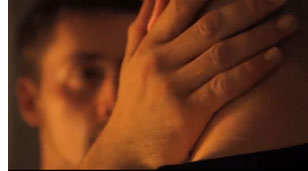|

The Passenger
TLA
Releasing,
2013
Director/Screenplay:
Tor Iben
Starring;
Niklas Peters,
Lynn Femme,
Urs Stämpfli,
Maxim Albert,
Annina Nusko,
Bastian Scheibe
Unrated,
62 minutes |
The Berlin Strangler
by
Michael D. Klemm
Posted online April, 2014

I like a good suspense thriller as much as the next guy. However, this one is not a good suspense thriller. Nor is it the good psychological mind-fuck that it should have been. If someone out there is able to find any point to The Passenger, the newest film by German director Tor Iben (The Visitor), please let me know if I’m missing something. |
 The blurb on the DVD box describes how a mysterious stranger named Nick invades the lives of Philipp, a professional photographer, and Lilli, a beautiful actress, and lures them into his “manipulative (and deadly) game of love.” Stories about disruptive strangers are often intriguing; one of the best is queer filmmaker Pier Paolo Pasolini’s 1968 Teorema wherein Terence Stamp seduces all the members of an uptight, bourgeois family. What the DVD box doesn’t say is that Nick is a serial killer. Neither does the trailer (although the trailer does end with the blood-covered protagonist washing himself by a stream.) I am not spoiling a major plot twist; Nick confesses this to the audience during the film’s first minutes - just after killing a male lover. This was not the movie I was expecting but that can sometimes be a good thing. The blurb on the DVD box describes how a mysterious stranger named Nick invades the lives of Philipp, a professional photographer, and Lilli, a beautiful actress, and lures them into his “manipulative (and deadly) game of love.” Stories about disruptive strangers are often intriguing; one of the best is queer filmmaker Pier Paolo Pasolini’s 1968 Teorema wherein Terence Stamp seduces all the members of an uptight, bourgeois family. What the DVD box doesn’t say is that Nick is a serial killer. Neither does the trailer (although the trailer does end with the blood-covered protagonist washing himself by a stream.) I am not spoiling a major plot twist; Nick confesses this to the audience during the film’s first minutes - just after killing a male lover. This was not the movie I was expecting but that can sometimes be a good thing.
|
|
Not this time. |
 Nick (Niklas Peters) is visiting Berlin for a couple weeks, allegedly to purchase a condo for his father. He rents a room from Philipp (who has a "good feeling" about Nick) and then begins to systematically seduce both Philipp (Urs Stämpfli) and his friend, Lilli (Lyn Femme). He genuinely likes both of his new companions but he also plans to kill them before he leaves Berlin. Nick tells the audience that, while he wants to put it off for as long as possible, their deaths will be “poetic” works of art. In the meanwhile, he cruises and kills a few strangers to pass the time. Nick (Niklas Peters) is visiting Berlin for a couple weeks, allegedly to purchase a condo for his father. He rents a room from Philipp (who has a "good feeling" about Nick) and then begins to systematically seduce both Philipp (Urs Stämpfli) and his friend, Lilli (Lyn Femme). He genuinely likes both of his new companions but he also plans to kill them before he leaves Berlin. Nick tells the audience that, while he wants to put it off for as long as possible, their deaths will be “poetic” works of art. In the meanwhile, he cruises and kills a few strangers to pass the time.
|
 I am not sure what the point of this movie was. A cautionary tale? Beware of wolves in sheep’s clothing? This is a film about a serial killer of whom we know nothing. The Showtime series, Dexter, provided a very elaborate – and fascinating - backstory that made it absolutely clear why Dexter had to kill. He was also a great antihero because the people he killed were murderers and child molesters who deserved their fate. The Passenger features a charismatic monster who kills innocent people for no reason. There is no insight into what makes his mind work at all. The film begins with him delivering a nonsensical monologue about how his “lust to kill” is “connected to certain star constellations” (and also the planet Pluto) and how maybe if he finds a pattern he can “control the lust.” And that is the entire psychological motivation that this film provides. Oh, and he has bad dreams now and then, usually after killing someone. I am not sure what the point of this movie was. A cautionary tale? Beware of wolves in sheep’s clothing? This is a film about a serial killer of whom we know nothing. The Showtime series, Dexter, provided a very elaborate – and fascinating - backstory that made it absolutely clear why Dexter had to kill. He was also a great antihero because the people he killed were murderers and child molesters who deserved their fate. The Passenger features a charismatic monster who kills innocent people for no reason. There is no insight into what makes his mind work at all. The film begins with him delivering a nonsensical monologue about how his “lust to kill” is “connected to certain star constellations” (and also the planet Pluto) and how maybe if he finds a pattern he can “control the lust.” And that is the entire psychological motivation that this film provides. Oh, and he has bad dreams now and then, usually after killing someone.
|
 Without the serial killer plot, the relationship that grows between the three leads is often quite charming. A delightful scene where the three of them ride bicycles together is reminiscent of Truffaut’s Jules and Jim. Admittedly, it is unsettling to watch how he creeps into Lilli and Philipp’s lives. This could have been a gripping thriller. Yet even though the audience knows that Nick is planning to kill these two innocents, somehow this movie unfolds without generating any suspense whatsoever. Without the serial killer plot, the relationship that grows between the three leads is often quite charming. A delightful scene where the three of them ride bicycles together is reminiscent of Truffaut’s Jules and Jim. Admittedly, it is unsettling to watch how he creeps into Lilli and Philipp’s lives. This could have been a gripping thriller. Yet even though the audience knows that Nick is planning to kill these two innocents, somehow this movie unfolds without generating any suspense whatsoever.
|
| 
|
 But this is what I hated about this movie. Spoiler alert: Skip this paragraph, and the next two, if you don’t want to know how the movie ends. Spoiler begins: After the long and sensual seduction of the innocents, Nick kills both of them. Since the buildup to this has been devoid of any suspense, the killings - when they come - are beyond anticlimactic. Not to mention pointless. For an epilogue, Nick runs shirtless and bloody through a forest, washes himself by a stream, takes a guilt cleansing shower, and then gets on a train where he befriends another young couple. And that’s it. The end. And so I ask again, what was the point of this movie? But this is what I hated about this movie. Spoiler alert: Skip this paragraph, and the next two, if you don’t want to know how the movie ends. Spoiler begins: After the long and sensual seduction of the innocents, Nick kills both of them. Since the buildup to this has been devoid of any suspense, the killings - when they come - are beyond anticlimactic. Not to mention pointless. For an epilogue, Nick runs shirtless and bloody through a forest, washes himself by a stream, takes a guilt cleansing shower, and then gets on a train where he befriends another young couple. And that’s it. The end. And so I ask again, what was the point of this movie?
|
 I could see it as a suspense thriller if one or both of his intended victims survived at the end and perhaps killed him in self defense. Hitchcock’s first rule of suspense is that the suspense is supposed to be relieved. Instead, what emerges is just a pointless exercise in cruelty. The audience spends the film with two likable characters just to watch them get needlessly killed at the end. Over the last years, I’ve seen a few movies that ended this way and it’s a trend that I don’t like. I’m not saying that all films have to have happy endings, far from it, but this is just the wrong way to end a movie. I could see it as a suspense thriller if one or both of his intended victims survived at the end and perhaps killed him in self defense. Hitchcock’s first rule of suspense is that the suspense is supposed to be relieved. Instead, what emerges is just a pointless exercise in cruelty. The audience spends the film with two likable characters just to watch them get needlessly killed at the end. Over the last years, I’ve seen a few movies that ended this way and it’s a trend that I don’t like. I’m not saying that all films have to have happy endings, far from it, but this is just the wrong way to end a movie.
|
 To the film’s credit, it’s not pornographically violent but I find it disturbing that the director titillates the audience in preparation for a killing. It would be different if Nick had a change of heart, or if at least one of his victims had gotten away at the end. I might not be as critical if there was at least some insight into the killer’s mind. Obviously he gets off sexually; the murders (in the tradition of Hitchcock) are filmed like sexual foreplay… but, once again, so what? He kills people, he doesn’t get caught, there is no redemption and he’s going to kill again. And the point of this story is? To the film’s credit, it’s not pornographically violent but I find it disturbing that the director titillates the audience in preparation for a killing. It would be different if Nick had a change of heart, or if at least one of his victims had gotten away at the end. I might not be as critical if there was at least some insight into the killer’s mind. Obviously he gets off sexually; the murders (in the tradition of Hitchcock) are filmed like sexual foreplay… but, once again, so what? He kills people, he doesn’t get caught, there is no redemption and he’s going to kill again. And the point of this story is?
|
 |
 Spoiler ends: It’s not as if the film doesn’t have its moments. There’s a cleverly filmed scene where Nick cruises a college student and plays hide and seek with him behind a row of pillars. Nick is handsome and seductive and it’s convincing the way his new friends fall under his spell. He easily beds Lilli, and there’s some good underlying sexual tension with Philipp as well. Philipp has a long distance girlfriend that is never seen, and he only photographs men (because he “knows them better”). Nick poses for him, shirtless. The homoeroticism of the photoshoot carries over from this scene to the gym and the locker room. These scenes are very well done; subtle and understated. A lot of the images are well shot and the cast, I must point out, is exceptional. Spoiler ends: It’s not as if the film doesn’t have its moments. There’s a cleverly filmed scene where Nick cruises a college student and plays hide and seek with him behind a row of pillars. Nick is handsome and seductive and it’s convincing the way his new friends fall under his spell. He easily beds Lilli, and there’s some good underlying sexual tension with Philipp as well. Philipp has a long distance girlfriend that is never seen, and he only photographs men (because he “knows them better”). Nick poses for him, shirtless. The homoeroticism of the photoshoot carries over from this scene to the gym and the locker room. These scenes are very well done; subtle and understated. A lot of the images are well shot and the cast, I must point out, is exceptional.
|
 Which is why The Passenger is so profoundly disappointing; it could have been a terrific thriller. It suffers from a very thin story with under-developed characters. The film is very choppy. There are way too many blackouts (this was a problem in director Iben’s previous film, The Visitor, as well). I like the director’s minimalist approach in both films, but this approach shouldn’t also extend to the characters to this degree. There are also two inept scenes, involving police investigators, which seem to have been tacked on as an afterthought. Believability is often stretched. Philipp and Lilli don’t seem to be the brightest bulbs on the planet. Nick puts Philipp in a headlock and almost strangles him and Philipp shrugs it off as horseplay. One night, after Nick has killed somebody, Lilli wakes up to see Nick’s face, and his pillow, covered in blood and thinks that it’s just a nosebleed. There’s an old joke that you should learn something when you watch a movie. Well, I learned that it’s possible to dispose of a body in broad daylight in Berlin and nobody will notice. Which is why The Passenger is so profoundly disappointing; it could have been a terrific thriller. It suffers from a very thin story with under-developed characters. The film is very choppy. There are way too many blackouts (this was a problem in director Iben’s previous film, The Visitor, as well). I like the director’s minimalist approach in both films, but this approach shouldn’t also extend to the characters to this degree. There are also two inept scenes, involving police investigators, which seem to have been tacked on as an afterthought. Believability is often stretched. Philipp and Lilli don’t seem to be the brightest bulbs on the planet. Nick puts Philipp in a headlock and almost strangles him and Philipp shrugs it off as horseplay. One night, after Nick has killed somebody, Lilli wakes up to see Nick’s face, and his pillow, covered in blood and thinks that it’s just a nosebleed. There’s an old joke that you should learn something when you watch a movie. Well, I learned that it’s possible to dispose of a body in broad daylight in Berlin and nobody will notice.
|
 The Passenger is so short (it’s only 62 minutes long) that I wonder if there’s another movie on the cutting room floor. What could have been a good film is buried somewhere inside of The Passenger but the ending, or lack thereof, ultimately does it in. While rehearsing a play, Lilli recites Oscar Wilde’s immortal words: “Each man kills the thing he loves,” but this film needs more than just a quote from Wilde to drive its engine. The Passenger is cold, without any real passion and that’s too bad because it could have been so much more. The Passenger is so short (it’s only 62 minutes long) that I wonder if there’s another movie on the cutting room floor. What could have been a good film is buried somewhere inside of The Passenger but the ending, or lack thereof, ultimately does it in. While rehearsing a play, Lilli recites Oscar Wilde’s immortal words: “Each man kills the thing he loves,” but this film needs more than just a quote from Wilde to drive its engine. The Passenger is cold, without any real passion and that’s too bad because it could have been so much more.
More On Tor Iben:
The Visitor (Cibrâil)
|

